If you understand how personal data is collected and disseminated online, you are probably wondering what you can do to clean up your digital footprint and remove yourself from the internet.
The amount of your data that is circulating online is enormous because it has been accumulating since you first logged on. Reports suggest that corporations like Google hold the equivalent of 1.5 million word documents about each individual. That represents a stack of papers that would tower approximately 150 meters above the ground – just like a skyscraper!
Preventing data about yourself from accumulating online – by being less forthcoming with personally identifiable information, providing false information when possible, and abstaining from providing unnecessary data – are all excellent practices for your future. But what do you do about the data that has already made its way online?
Using privacy technologies such as anti-tracking extensions, private search engines, and VPNs can help to prevent your personal information, web browsing habits, and metadata from being exploited. We will walk you through these and other useful tips later. First, however, we will recommend services that actually help you to remove yourself from the internet.
Best services to remove yourself from the internet
Below, we have included a quick list of the best services to remove your data from the internet. For more information about each service, scroll down for detailed summaries that will help you pick between them.
Best services to remove yourself from the internet:
- Incogni: Removes your data from a large cross-section of data brokers in the US, the EU, and the UK. Super easy to use. Keeps checking to ensure your data isn’t re-added to databases. One-on-one consultations are available. Fantastic value for money.
- Privacy Bee: Removes your data from hundreds of data broker sites. Lets you choose which companies can and can’t control your data. Comes with a tracking prevention extension. Highly comprehensive, but a little pricey.
- Delete me: Removes your data from 38 US data brokers in total. US-based service only works to remove you from American data brokers. Helps prevent you from appearing in Google search results. Checks back every 3 months to ensure your data isn’t re-added.
Want the best data removal service? We recommend Incogni because it provides a superior data removal service to keep your data out of the hands of data brokers. Best of all, it is a bargain considering how effective it is.
1. Incogni
Incogni is a data removal service developed by the team behind Surfshark. This is a highly trusted VPN brand well known for providing high levels of privacy. Its data removal service allows anybody to sign up and easily have their data removed from a large number of data brokers. What we admire about this service is that it will contact local data protection authorities if any data brokers fail to comply with data removal requests.
Another benefit of Incogni is that it handles all interactions with data brokers on your behalf. This makes the service extremely easy to use. Users can pick how long they want to subscribe to the service. This means you can pay to remove your data from brokers for a short time if you prefer. A single month’s subscription will cost you $11.49. However, you can reduce that cost to just $5.79 by signing up for a year (billed in a single installment of $69.48).
Once subscribed, Incogni will actively remove your information from databases held by data brokers in the USA, the EU, and the UK. That makes it a highly comprehensive privacy service that massively reduces the amount of data that is available online to businesses, government agencies – and even stalkers.
Incogni also helps you to reduce the amount of spam you receive, to prevent telemarketing calls, and to reduce the frequency of targeted ads as you surf the web. Plus, it can protect you against scammers seeking to purchase your data from people search sites.
The only caveat is that the service is currently only available for consumers in the US, the UK, and the EU. If you live in one of those locations, however, you can give the service a test run by making use of its 30-day money-back guarantee.
2. Privacy Bee
Privacy Bee is another popular data removal service that allows consumers to clean up their digital footprint. It is one of the most comprehensive services available on the market. It claims to remove user data from over 200 data broker sites. It also keeps checking back to ensure that removed data isn’t re-added at a later date.
Privacy Bee removes you from people search sites, which massively improves your privacy. This is good news because people search sites can easily be leveraged by anyone willing to pay to find out information about you – whether for stalking or to acquire data useful for phishing or identity theft.
Admittedly, Privacy Bee is expensive compared to our top recommendation. It is also worth noting that Incogni is constantly adding more data brokers to its removal database. This makes it comparable to Privacy Bee when it comes to removing users from American, British, and European data brokers.
One advantage of Privacy Bee is that it comes with additional features such as an active tracker blocking extension for your web browser. However, paying the rather steep cost of $197 per year for this extra is a little foolish when you can make use of free extensions like uBlock Origin and Privacy Badger to achieve the same (or better) results.
On the other hand, Privacy Bee promises to monitor the web for data leaks and data breaches that may affect you. Despite this feature, the primary benefit of the service remains its ability to remove you from data broker sites. When it comes to doing this, the service is very good. However, at more than double the cost of Incogni, it seems fair to say that Privacy Bee appeals to consumers who have more cash to splash around.
3. DeleteMe
DeleteMe by Abine is third on our list of the best services to remove yourself from the internet. It is a US-based service that works to remove your data from 38 well-known US data brokers and people finder sites. This may sound like a small number of data brokers compared to our other recommendations – but rest assured that it works to remove data from all of the most invasive US data brokers.
DeleteMe subscribers have their personal information, including their name, address (and previous addresses), age, photos, occupation information, phone numbers, email addresses, relatives, marital status, social media info, and financial information removed from market-leading US data brokers.
A yearly subscription costs $129 for a single user, with discounts provided to consumers who opt for a multi-user plan. This is pretty costly when compared to Incogni, which costs less but works to remove your data from British and European data brokers in addition to companies based in the USA.
Anybody who signs up to DeleteMe will receive an initial removal report after seven days. Following that the service will remove your data from data broker databases four times in total. Each account is managed in person, to ensure that your data has not been re-added to data broker sites every 3 months. Users can also make custom removal requests that are handled on their behalf by the account rep.
One of the nice things about DeleteMe is that it is easy to communicate with its team using live chat on its website. This allows you to ask questions when using the service or before signing up. Add to this DeletMe’s stellar reputation with consumers – who have given it a whopping 4.67 stars on sitejabber – and you can see why DeleteMe is worth consideration.
The only thing to note is that if DeleteMe is unable to have your data removed from a website itself, it may require you to do some of the work. This may annoy some subscribers. However, DeleteMe agents work hand-in-hand with you and explain exactly what to do. The service also provides the resources necessary to complete the take-down request, so it is not tricky.
Why should I remove my data from the internet?
Data brokers make it their business to harvest information about individuals. This profile is then made available to marketing companies, government agencies, businesses, and even individuals who are willing to pay. This is pretty scary because it means that everything you have ever added to the internet – or is potentially added about you by somebody else – could be used to make decisions about you.
What it is important to understand, is that seemingly trivial datasets can be used to identify precise secondary inferences about you. Time after time, studies have revealed that disjointed information can be combined using algorithms to pinpoint facts about people. This can lead to data being used to make decisions about people’s eligibility for loans, insurance, and even their suitability for employment.
People’s likes, habits, and web visits can also reveal highly sensitive personal information about their location, history, financial status, health, previous employment, political affiliations, religious beliefs, and even sexual preferences. Understandably, knowing how their data is shared and sold across the internet, and how this affects them, makes people uneasy.
Unfortunately, there are tons of services that harvest and aggregate data about consumers. The problem has become an epidemic, and experts now regularly refer to personal data as a currency and its trade as a data economy. Under these circumstances, consumers have a right to protect their worth. That is why we actively encourage everybody to take control of their data by removing it from the internet.
Can I remove data from data brokers myself?
Yes. There is nothing stopping you from contacting data brokers and person-finder websites yourself. Those companies should comply with your takedown requests. However, please bear in mind that this process is very involved and can be extremely time-consuming – particularly if you don’t already have the contacts to make those requests.
It is also worth noting that data brokers do not always delete your data completely when you ask for it to be removed. Instead, data brokers may put your data on ice. Although the company is no longer selling or sharing your data, it still has it somewhere and could bring it back at a later date.
This practice ought to be illegal. Unfortunately, data brokers can claim that they simply reacquired your data, which is why this is thought to be fairly common practice. To prevent this, data removal services like Incogni continue to chase up data brokers on a regular basis.
Do data brokers need my permission to collect my data?
Unfortunately, the answer to this question is no. Although data protection regulations like GDPR (in the EU) and CCPA (in California) allow consumers to make takedown and deletion requests (right to be forgotten); this does not prevent data brokers from collecting your data in the first place.
The important thing to remember is that data aggregators seek out publicly available information that is already circulating online. They also acquire data being shared legally by companies whose privacy policies allow them to sell or share your data. This is why it is vital for consumers to understand how their data will be leveraged by the sites and services they opt for.
Ultimately, consumers must actively seek to keep as much data about themselves off the internet as possible. This is why it is vital not only to attempt to remove data from the internet – but also to prevent it from accumulating there in the first place.
What can I do to improve my digital footprint myself?
Once consumers have uploaded their data to the internet, it can be very hard to completely erase this information. For this reason, it is important for consumers to carefully consider what they upload in the first place. This is why we advise consumers to consider the principles of digital minimalism, data reduction, and data obscurity (more on this later).
So, how do you go about living your life with added privacy? Your first option is to delete social media accounts, old email accounts, and other online accounts. This is a good way to tidy up behind yourself but doesn’t necessarily guarantee that your data will disappear entirely from the web.
Services like Facebook and Google are known to create invasive databases about their users. This includes accumulating data about their likes and preferences, shopping habits, hobbies, employment status, and many other sensitive parameters.
Deleting a publicly-facing account can ensure that nobody hacks it – or uses it to gather data about you. However, it does not necessarily mean that the service provider itself no longer has data about you. This is why you should carefully consider what you are uploading to websites, and even consider providing false information whenever possible.
Stop installing unnecessary apps
Apps create another way for your data to be collected and disseminated online. Many apps have invasive permissions that allow them to access the contents of your device, including photos, address book entries, and other personal information.
To prevent this data from being collected and shared, it is essential to consider what permissions the app requires and whether it seems necessary to the function of the app or service.
We also urge you to consider whether you really need the app in question. The fewer unnecessary apps you install – the less chance you have of allowing companies to harvest and exploit your data.
Stop registering new accounts
Registering more and more new accounts, and linking these random new accounts to existing social media accounts to verify them massively increases the avenues by which online surveillance can occur. For this reason, it is best to stop creating new online accounts wherever possible.
Avoiding registering new accounts and allowing them to share data with existing services like Facebook will prevent your data from accumulating online and being shared by those providers. Instead, keep data minimization in mind, and focus on maintaining a few important accounts that you actually need.
By the same token, try to avoid handing out your email address unless you absolutely have to. To this end, ask yourself whether you should hand over your email or other personal data when asked to by a checkout clrek, when filling out surveys, etc.
Use a Virtual Private Network
A VPN is an online privacy tool that helps to reduce the amount of tracking and surveillance that targets you online. It works by encrypting your web traffic to stop local network providers, wifi hotspot providers, Internet Service Providers, government agencies, and other eavesdroppers from monitoring what you do online.
A VPN also conceals your IP address from the websites you visit. This stops those websites from tracking you each time you return to their site. This removes an invasive layer of profiling. It also prevents websites from knowing where you are, which can help to prevent personalization and targeted advertising.
Follow the link to find out more about using a VPN connection to gain online privacy, freedom, and security.
Use ad-blocking and tracker blocking extensions
Every time you use you surf the web, the websites you visit can install trackers and cookies onto your browser. These stubborn trackers can follow you around the internet, which allows companies to profile you. It is as a result of these trackers that websites follow you around the internet and serve you personalized advertising.
The good news is that there are a number of free extensions that you can use to stop third-party services from tracking you and installing cookies in your browser. Below, we have included a list of extensions we strongly recommend you use whether you are a Chrome, Firefox, or Edge user.
- uBlock Origin. This is a superb extension that blocks third-party scripts and prevents online tracking.
- Privacy Badger. This is an extension developed by Electronic Frontier Foundation. It prevents advertisers and other third-party trackers from covertly tracking where you go and what pages you visit online.
- Adblock Plus. This is an extension that blocks ads allowing pages to load faster, saving your data allowance on mobile plans, and preventing you from being targeted with ads on the pages you visit.
- No script. This is an advanced script blocking extension that can be used to block all scripts on the websites you visit. Just bear in mind that you will need to let some scripts through the blockade to use legitimate website features.
- Ghostery. This extension monitors all the third-party servers being contacted by the websites you visit and blocks any services that are known to be trackers and data collection services.
What is digital minimalism?
Digital minimalism is the practice of purposefully abstaining from providing personal data online. It is the best way of reducing your digital footprint to protect yourself against cybercrime and surveillance capitalism.
By consciously withholding your information – or providing false information about yourself whenever possible – you can minimize the amount of genuine information that is circulating online.
This ensures that data aggregators, social media companies, and other big tech firms are not privy to such large quantities of data about you – which can lead to peace of mind and a reduced risk of exploitation and cybercrime.
What is digital obscurity?
Privacy by obscurity is the practice of making genuine data about yourself hard to obtain or understand. This can be achieved in a number of ways, but most often by refusing to provide genuine information unless it is absolutely necessary.
For example, you could use alias email addresses and forwarding phone numbers to avoid handing out your real details. These details are often required to join and verify online services, but by using forwarding addresses it is possible to conceal your real information and identity.
This practice serves to massively reduce the amount of genuine data circulating about you and helps stop data brokers from invading your privacy. The nice thing about forwarding email addresses, phone numbers, and payment methods, is that they can be abandoned at any time.
This gives you the opportunity to get a clean slate, which helps to stop spam phone calls or marketing calls when a phone number makes its way onto undesirable call lists.
Using pseudonyms is another way to increase your online privacy by preventing data sets from being connected to your real identity.
L’article How to remove yourself from the internet est apparu en premier sur Comparitech.
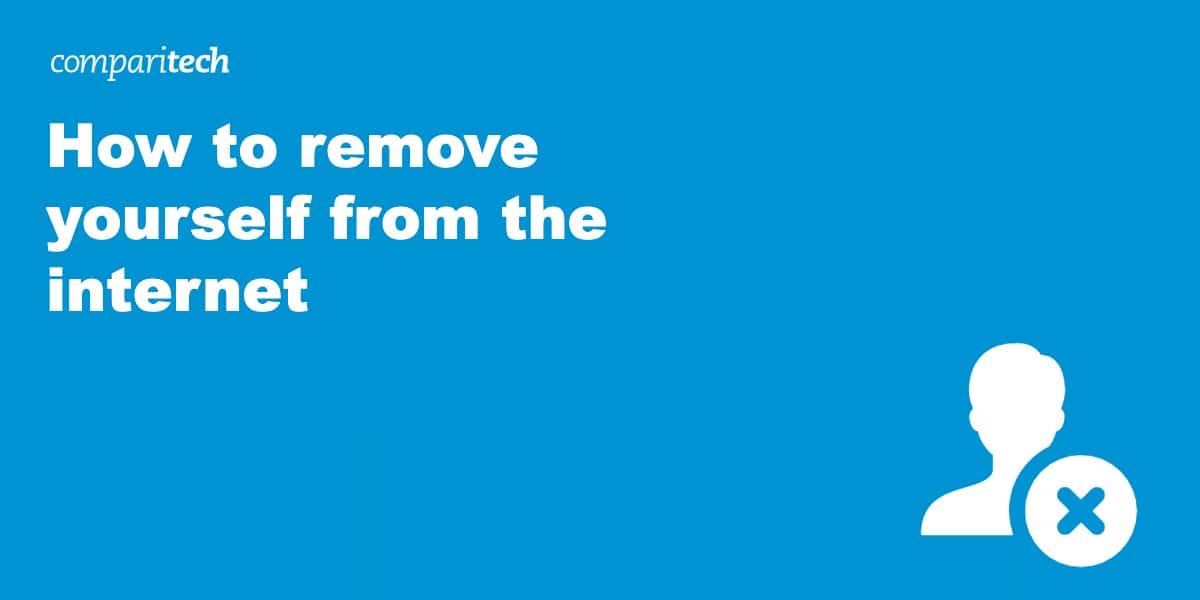
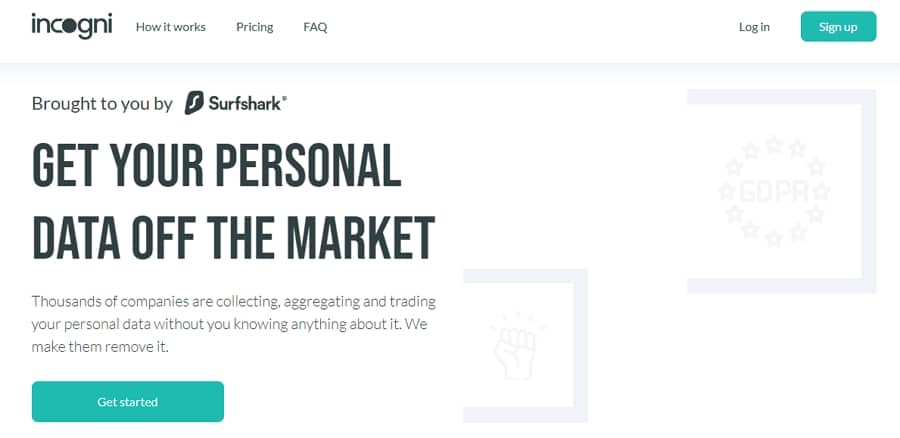
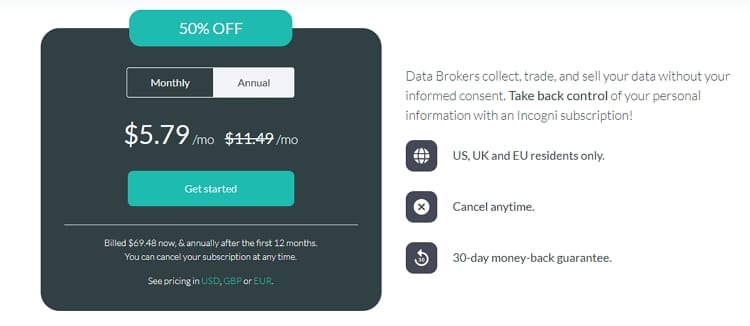
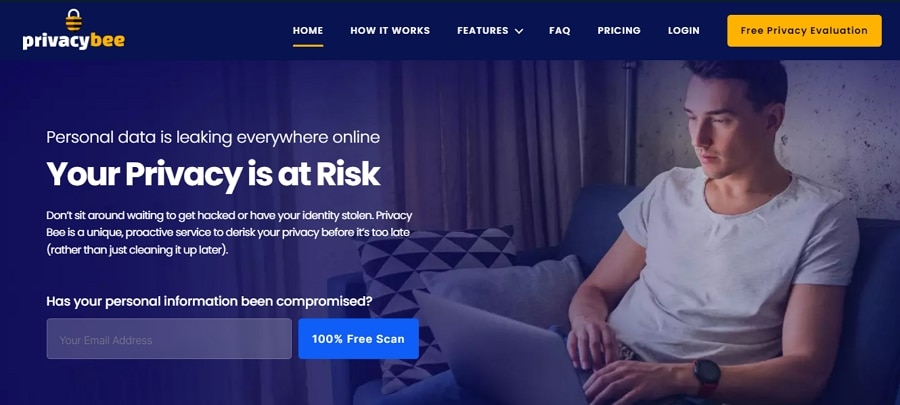
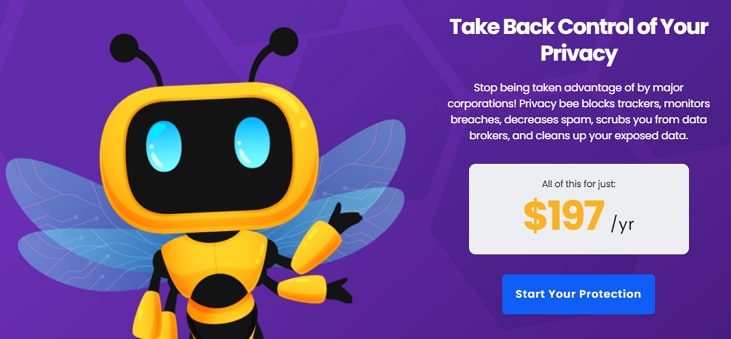
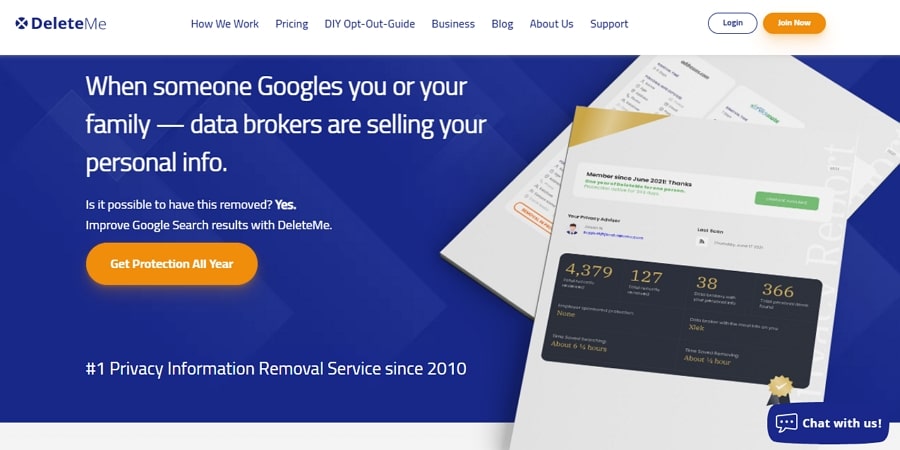
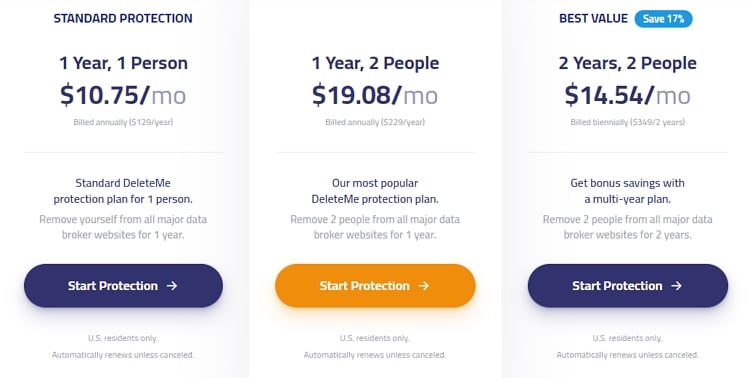
0 Commentaires